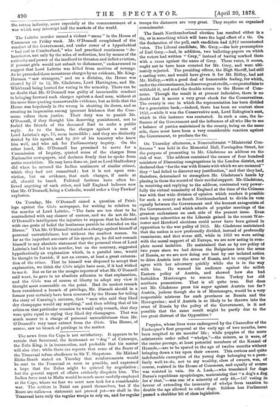On Tuesday, Mr. O'Donnell raised a question of Privi- lege
against the Globe newspaper, for writing in relation to the murder of Lord Leitrim, "The facts are too clear to be contradicted with any chance of success, and we do not do Mr. O'Donnell's intelligence the injustice to suppose that he followed with one grain of belief the loathsome parable he obtruded on the House." This Mr. O'Donnell treated as a charge against himself of personal untruthfulness, but without the smallest reason. So far as the imperfect accounts of his speech go, he did not commit himself to any absolute statement that the personal vices of Lord Leitrim's had led to his murder, but on the contrary, suggested hypothetically an explanation which, in a parallel case, would be thought to furnish, if not an excuse, at least a great extenua- tion of the crime. That he himself was disposed to accept that explanation, we think the Globe might have seen, if it had wished to see it. But so far as the meagre reports of what Mr. O'Donnell said went, he gave in no absolute adhesion to that explanation, and the Globe was of course at liberty to adopt any view it thought most reasonable on the point. Had its modest remark been considered a breach of privilege, Mr. Disraeli should in a former year certainly have been censured by the House for telling the story of Canning's sarcasm, that "men who said they liked dry champagne would say anything," and then adding that of his critics on that particular occasion he would only remark, that they were quite equal to saying they liked dry champagne. That was much nearer to a charge of personal untruthfulness than Mr. O'Donnell's very tame extract from the Globe. The House, of course, saw no breach of privilege in the matter.


































 Previous page
Previous page